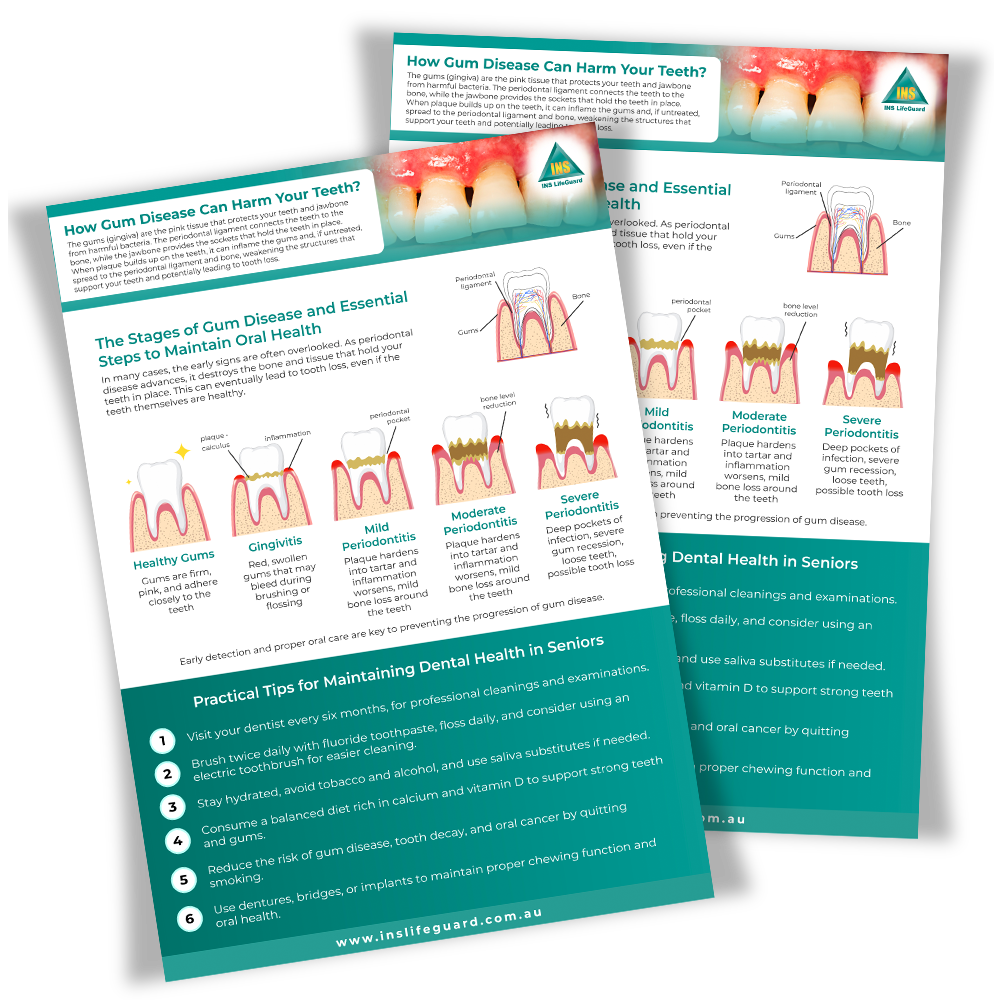INS LifeGuard
Gum Disease in Seniors: What You Need to Know

More than 60% of Australians over the age of 75 are affected by gum disease, and over a third have experienced complete tooth loss. The lack of adequate oral healthcare for older adults has far-reaching consequences beyond just dental issues; it can profoundly impact their overall well-being. Poor oral health can lead to difficulties with eating, speaking, and maintaining proper nutrition, all of which are crucial for a good quality of life. Additionally, untreated gum disease can contribute to other serious health problems.
In this blog, we'll delve into the details of gum disease, its causes, prevention, and why addressing it early can save your teeth.
What is Gum Disease?
Gum disease is a persistent inflammatory condition that not only affects the gums but also impacts the surrounding bone structure that supports your teeth. It begins with the formation of plaque, a sticky bacterial film that coats your teeth. If not removed, this plaque can solidify into tartar, which leads to gingivitis—the initial phase of gum disease. When left untreated, gingivitis can advance to periodontitis, a more severe stage where the gums begin to pull away from the teeth, forming pockets that can become infected.
Here are the common symptoms to watch for:
- Persistent bad breath
- Sensitivity to hot, cold, or sweet foods
- Swollen, bleeding gums
- Discomfort or pain while chewing
- Gum recession
- Formation of deep pockets
- Change in bite
- Loose or shifting teeth
- Tooth loss
Why Are Seniors at Higher Risk?
As we age, our bodies experience various changes that can significantly impact our overall health, including oral health. One major concern is the increased risk of gum disease, which can lead to severe dental problems if left untreated. Several factors contribute to the rise of gum disease in older adults.
A weakened immune system makes it harder to fight off infections, including those affecting the gums. Additionally, medications commonly prescribed to seniors often reduce saliva flow, creating an environment where plaque and bacteria can more easily build up, leading to gum disease.
Gum recession is another common issue with ageing, as the gums naturally recede over time, exposing the roots of the teeth. These exposed roots are more vulnerable to decay and infection, further increasing the risk of gum disease.
Long-term lifestyle choices, such as smoking, poor diet, and inadequate oral hygiene, also play a significant role, as their cumulative effects can become more pronounced in later life. Older adults may also have less access to regular dental care or may underestimate the importance of maintaining good oral hygiene, allowing gum disease to progress unchecked.
The Stages of Gum Disease and Essential Steps to Maintain Oral Health
One of the most concerning aspects of gum disease is its silent progression. The damage caused by advanced periodontitis is often irreversible and requires intensive dental treatment. Knowing the stages of gum disease is key to maintaining oral health, particularly as you age. Download our free resource for a clear overview of each stage and symptoms, along with practical tips to help seniors protect their oral health and overall well-being.

How Gum Disease Can Impact Heart Health and Quality of Life
Research has shown that periodontal disease, commonly known as gum disease can be a contributing factor to other serious health issues such as heart disease.
While gingivitis causes red, swollen, and tender gums, periodontitis is more severe, leading to the formation of deep pockets filled with bacteria and pus. This advanced stage of gum disease is particularly concerning because it allows bacteria to enter the bloodstream more easily. Once these bacteria are in the bloodstream, they can spread throughout the body, potentially triggering inflammation in various organs, including the heart. The specific bacteria associated with periodontal disease, such as
Streptococcus sanguis, are also linked to an increased risk of heart disease and stroke.
Additionally, gum disease can lead to tooth loss, which significantly impacts a senior’s ability to chew and enjoy a variety of foods, potentially leading to nutritional deficiencies. Chronic pain from inflamed gums, exposed tooth roots, and abscesses can also make daily activities difficult. This persistent discomfort can also lead to irritability and mood swings, further straining relationships and diminishing the quality of life.
Effective Approaches to Managing Periodontal Disease in Seniors
Treatment of periodontal disease in seniors typically involves a combination of professional dental care and improved oral hygiene practices at home. The specific approach depends on the severity of the disease, but common treatments include the following:
Scaling and Root Planing
This deep-cleaning procedure is the most common initial treatment for periodontal disease. Scaling removes plaque and tartar from the tooth surfaces and beneath the gums, while root planing smooths the root surfaces to help gums reattach to the teeth and prevent further buildup.
Medications
Dentists may prescribe antimicrobial mouth rinses, antibiotic gels, or oral antibiotics to help control bacterial infection and reduce inflammation.
Laser Therapy
An alternative for patients with sensitive gums, laser therapy offers a less painful option, utilising light energy to eliminate bacteria and promote gum regeneration.
Pocket Reduction Surgery
Involves making small incisions to lift gum tissue for deep cleaning, essential for removing tartar and reducing bacterial spread.
Gum Grafting
Address gum recession by transplanting healthy tissue to cover exposed roots, reducing sensitivity and preventing further recession.
Bone Grafting
Utilised in severe cases where bone loss has occurred, this procedure aids in regenerating lost bone and tissue, providing stability for teeth.
Takeaway
Addressing gum disease goes beyond just maintaining a healthy smile—it's crucial for safeguarding your overall health and well-being. By taking proactive steps like practicing good oral hygiene, scheduling regular dental check-ups, and adopting a healthy lifestyle, you can significantly reduce the risks associated with gum disease and enhance your quality of life.
At INS LifeGuard, our personal alarm system provides seniors with immediate access to professional nurses, ensuring that they are never alone when facing sudden discomfort, pain, or other health issues. We are here to support you in managing these potentially serious situations. To learn more about how our products and services can help you or your loved ones live safely and independently, please
contact us today.

About
INS LifeGuard is the only 24/7 nurse on-call personal and medical monitoring in Australia. We provide monitoring technology for both in the home and on the go and can also monitor other provider's equipment. Our services are suitable for anyone wanting support to stay independent such as the elderly, those with medical conditions and disabilities plus enhancing safety and security for lone workers.













